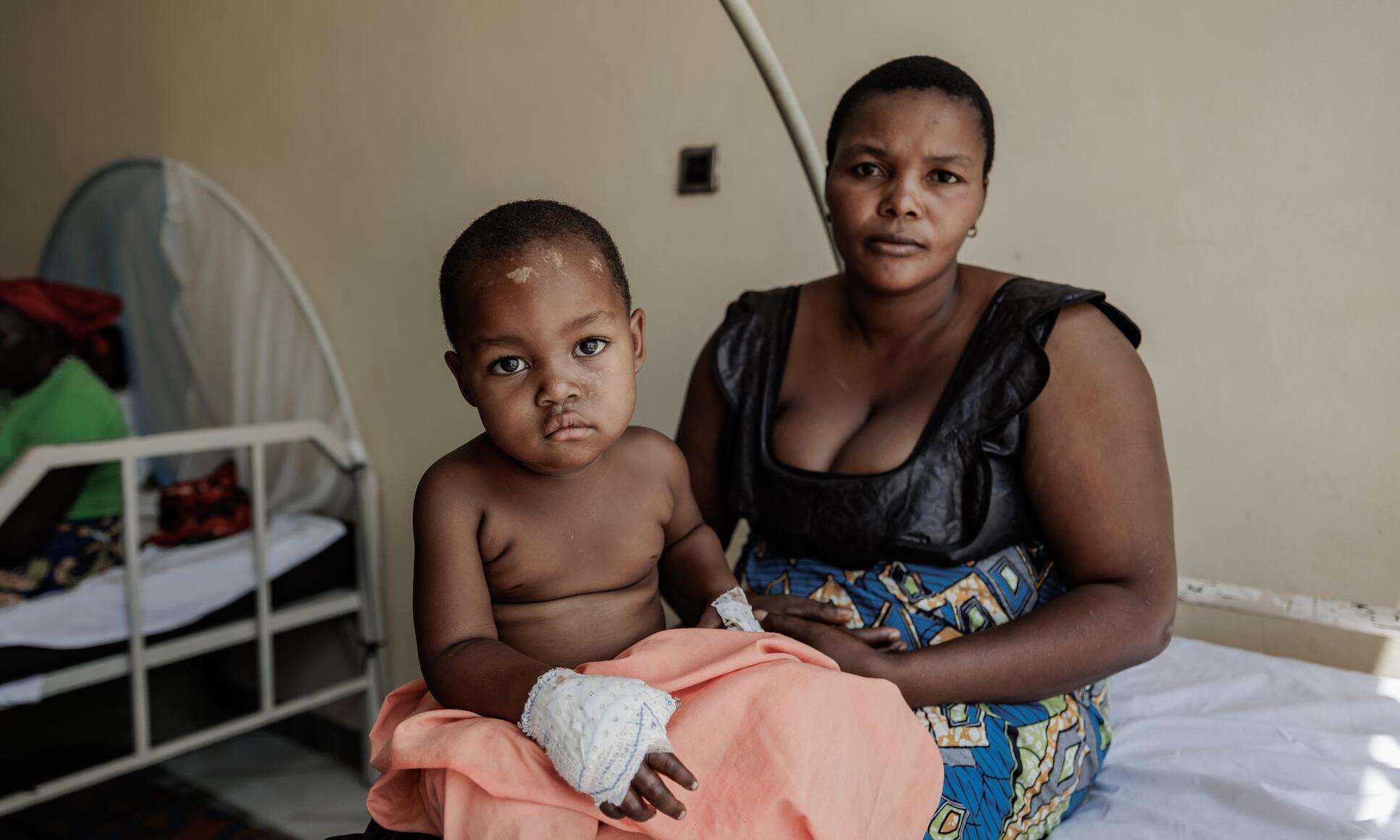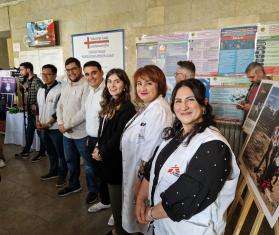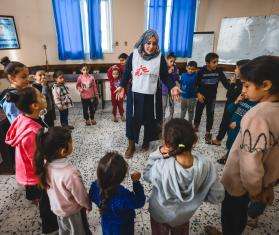Ituri province, eastern Democratic Republic of Congo (DRC), has been gripped for decades by recurring cycles of violence. In response to critical medical needs, last June Doctors Without Borders/Médecins Sans Frontières (MSF) set up a center specializing in trauma surgery and post-surgical care at Salama Hospital in Bunia. One-third of the 863 patients we treated between June and December 2023 were direct victims of the violence.
Since mid-February, there has been a resurgence of attacks by armed groups in Ituri, many targeting civilians. The result has been large numbers of casualties, especially among women and children.
Entering the grounds of Salama Hospital in Bunia, immediately one is struck by the bustling activity: outside, the families of patients are cooking and washing their dishes in large plastic buckets; inside, the corridors are busy and every single room is occupied. Many of the patients have very visible injuries—some have painful-looking external fixators on their arms, shoulders, or legs; others have limbs in plaster or bandages on their bodies.
The focus of MSF’s center at Salama Hospital is trauma surgery and orthopedic care, but our teams also treat victims of burns and road accidents—a decision driven by the significant prevalence of these types of injuries and the absence of specialist medical care for these patients elsewhere in the province.
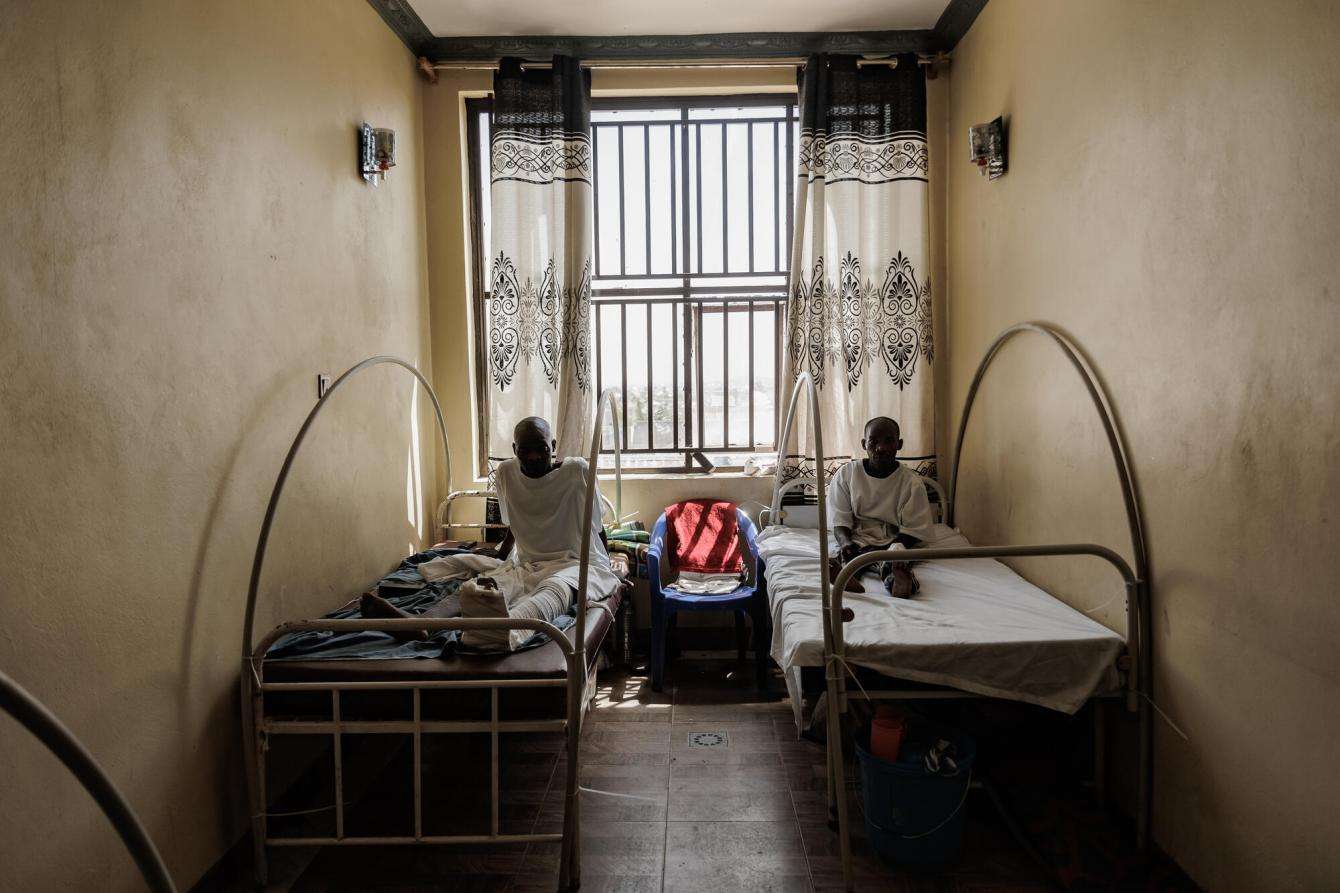
A boy yearns to walk
As we are shown around the hospital by a doctor, the persistent and heart-wrenching cries of a child pierce the air. Unable to ignore the distressing sound, I look through a door and see a little boy of about five sitting on a bed beneath a mosquito net.
"Why is he crying?" I ask. A nurse explains that the boy, who has serious burns on his legs and chest from a domestic accident, desperately wants to get up and check if he will still be able to walk properly. However, his grandmother, seated next to him, has said no, following the doctors’ general advice that he should stay in bed, sitting down or lying with his legs out straight.
The doctor suggests to the grandmother that letting the child use his legs will do him no harm, and she relents. The boy is gently lifted from the bed by his grandmother and the nurse. With cautious steps, he walks slowly across the room, looking like a little old man. The sense of relief on his face is palpable. As we offer encouragement and applause, his mood visibly lifts. When we leave the room with a wave, he has a smile on his face.
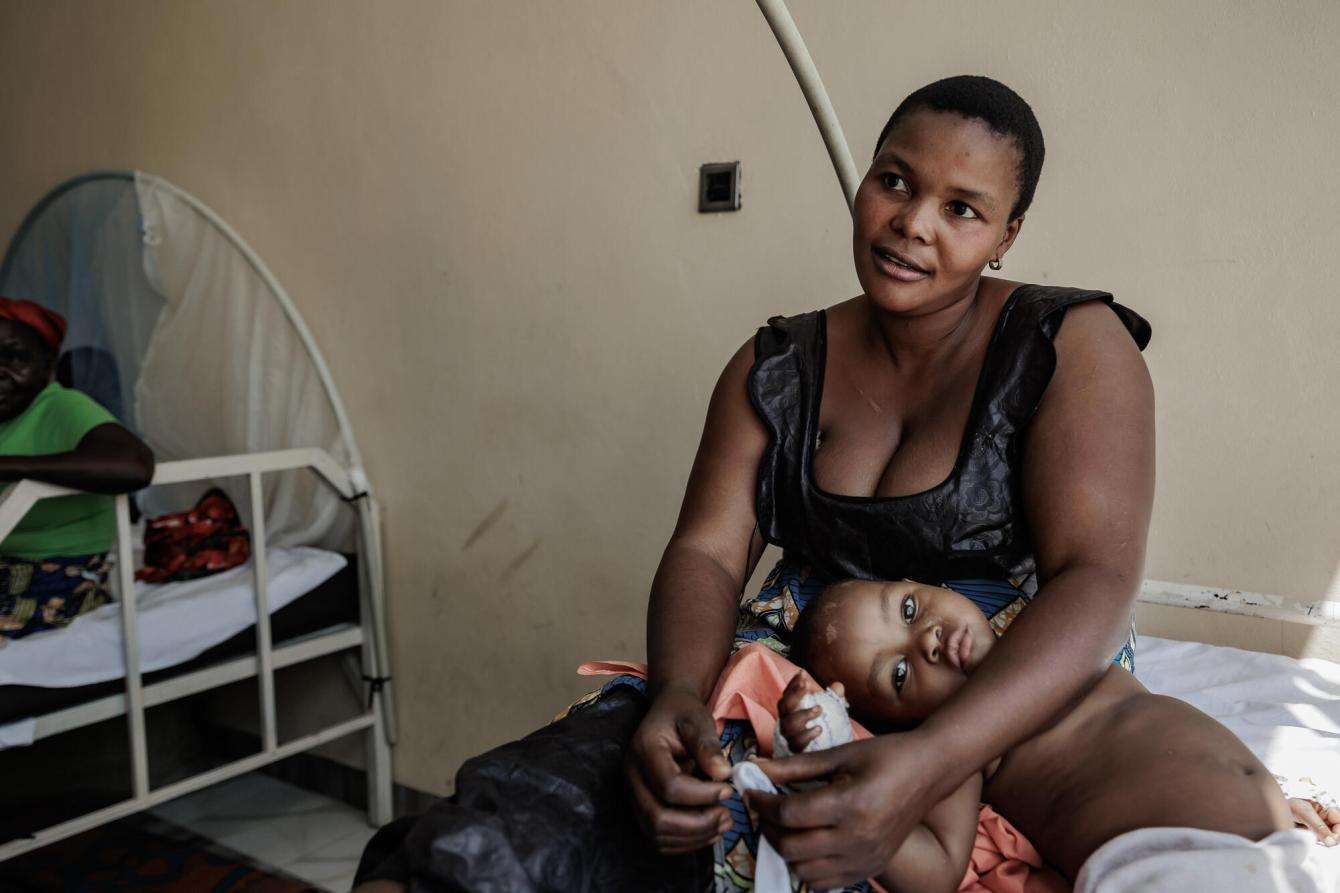
A grandmother and toddler attacked
Further down the corridor, we meet another child, two-year-old Christelle.* She is nestled in the arms of her mother, finding comfort amid the hospital's noise and bustle. Christelle and her mother Clarisse* come from Drodro village, which was recently the scene of intercommunal violence. At first glance, nothing appears to be wrong with the child, but then her mother tells their story, which is nothing short of horrifying.
“Christelle fell victim to an attack by an armed group on my village,” says Clarisse. “Suddenly, I saw a group of men entering the courtyard where I was sitting with my five children and their grandmother. When I realized they were heavily armed with guns and carried machetes, I got scared and quickly gathered my children in panic. I grabbed the hands of my oldest daughter and another of my children and ran without looking back.”
Clarisse pauses and gulps for breath, avoiding eye contact and visibly traumatized. “I managed to reach and enter the house of our neighbors, but the children’s grandmother reached the house too late. The armed men seized her and cut off her arm with a machete. Christelle cried out in fear and tragically also fell victim to the ruthless men, who tried to kill her with a machete.”
Christelle sustained deep cuts to her back, thighs, and one arm. Her seriously injured grandmother managed to flee to the bush to hide.
“From the window of the house, I could see the armed men roaming around our neighbors’ houses further down the street,” says Clarisse. “I quickly went out to take my wounded child inside, then I went to retrieve grandmother, and we locked ourselves in the house again until late in the evening. When the armed men left the village, we sought help and were escorted by MONUSCO [UN peacekeeping forces] to MSF’s health facility in Drodro, where we were immediately transferred to the hospital here in Bunia.”
Looking at the child in her mother’s arms, I am horrified by what she has experienced. No child should go through this suffering and trauma. Yet women and children bear the brunt of the conflict in eastern DRC, with horrific violations committed on a daily basis.
According to the UN, DRC is one of the five conflict zones with the highest numbers of serious violations against children, alongside Palestine, Somalia, Ukraine, and Syria.
MSF’s project has played an important role in saving lives while offering tailored and quality care to reduce the level of functional disability that patients might otherwise face for the rest of their lives.
*Names have been changed
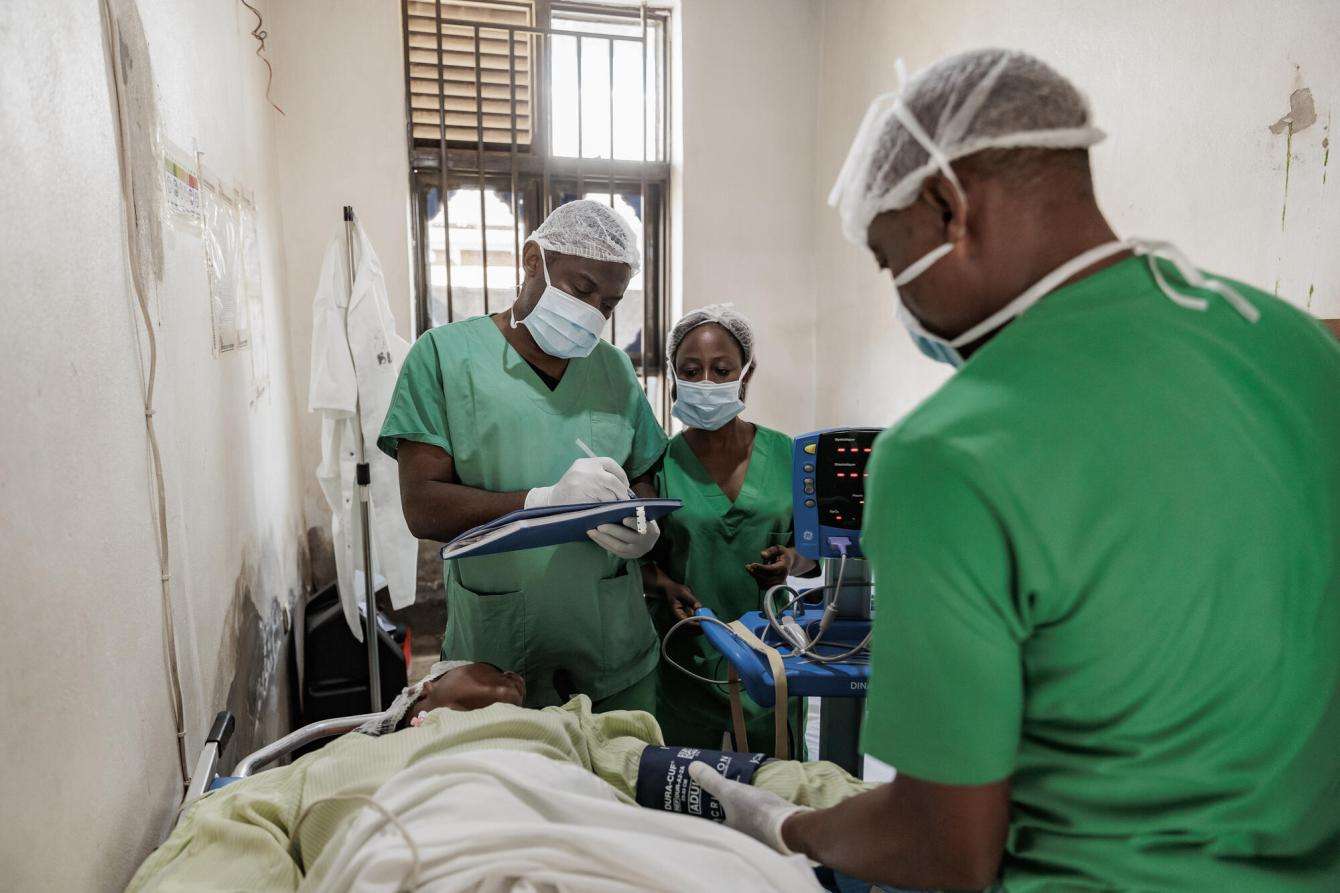
About MSF’s work in DRC
With a total capacity of 45 beds, MSF's trauma and orthopedic care center in Bunia serves as a crucial health care hub for the people of Ituri province, who have been affected by protracted conflict. As well as providing complex trauma surgery, medical teams in Bunia treat patients with burns and provide post-trauma care, including physiotherapy and mental health consultations.
To strengthen local health care infrastructure and improve the quality of medical care, MSF teams are also training local medical staff, improving the quality of biomedical equipment, supporting the referral system, donating medical equipment, and constructing health infrastructure. MSF's support also extends to the general reference hospital.
In addition to the project in Bunia, MSF supports two Ministry of Health hospitals, 12 health centers, three advanced health posts, and 20 community care sites in Drodro and Angumu, where our teams predominantly treat malnutrition, malaria, and common childhood diseases, and provide care for survivors of sexual violence and psychological support.
MSF has been working in DRC for more than 40 years and currently runs projects in 20 of the country's 26 provinces, providing medical care to victims of violence, displaced people, and those suffering from disease epidemics including measles, cholera, meningitis, and HIV. MSF also has emergency response teams on standby throughout the country to respond to epidemics, natural disasters, and conflicts.
